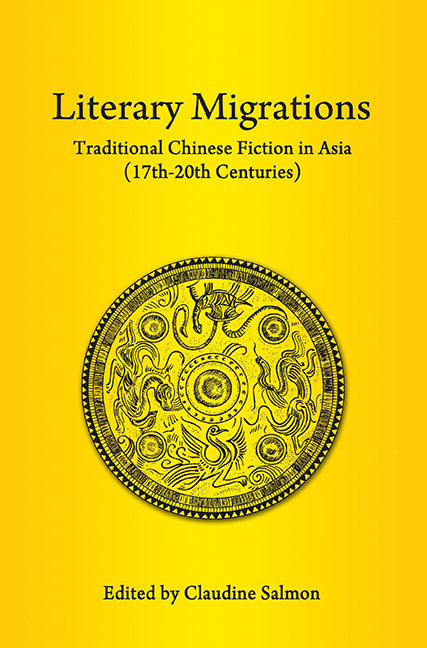Book contents
- Frontmatter
- Contents
- FOREWORD
- Dr Salmon as I Know her
- Preface to Reprint Edition
- Acknowledgements
- INTRODUCTION
- PART I KOREA AND JAPAN
- PART II MAINLAND NORTHEAST ASIA
- PART III MAINLAND SOUTHEAST ASIA
- 7 The Influence of Chinese Fiction on Vietnamese Literature
- 8 Thai Translations of Chinese Literary Works
- 9 Chinese Literary Influence on Cambodia in the Nineteenth and Twentieth Centuries
- PART IV INSULAR SOUTHEAST ASIA
- Bibliography
- Author, story-teller and translator index
- Title index
- List of Plates
- Contributors
- Plate section
8 - Thai Translations of Chinese Literary Works
from PART III - MAINLAND SOUTHEAST ASIA
Published online by Cambridge University Press: 21 October 2015
- Frontmatter
- Contents
- FOREWORD
- Dr Salmon as I Know her
- Preface to Reprint Edition
- Acknowledgements
- INTRODUCTION
- PART I KOREA AND JAPAN
- PART II MAINLAND NORTHEAST ASIA
- PART III MAINLAND SOUTHEAST ASIA
- 7 The Influence of Chinese Fiction on Vietnamese Literature
- 8 Thai Translations of Chinese Literary Works
- 9 Chinese Literary Influence on Cambodia in the Nineteenth and Twentieth Centuries
- PART IV INSULAR SOUTHEAST ASIA
- Bibliography
- Author, story-teller and translator index
- Title index
- List of Plates
- Contributors
- Plate section
Summary
Translation of Chinese literary works into the Thai language can be divided roughly into three periods as follows:
From the time of King Rama I to King Rama V (1782–1910).
From the time of King Rama VI to King Rama VIII (1910–46).
From the time of the present reign up to now.
In the first period, the Chinese literary works that were translated into Thai were mainly historical romances. There are altogether thirty translations done from the time of King Rama I to the time of King Rama V. The very first translation from Chinese is “The Romance of the Three Kingdoms” which was translated in the reign of King Rama I. The translation of Chinese historical romances into Thai in the reign of King Rama I to King Rama III were all done under royal patronage, while those translated in the reign of King Rama IV and V were under the patronage of high-ranking royal officials.
In the second period, translations from Chinese were those of historical stories and novels, and they were done under the patronage of the owners of publishing houses or newspaper editors. Translations of Chinese historical novels were first published in series in Thai newspapers in 1921 and were very popular among the readers. Some newspapers such as Srikrung published at least one series or sometimes three in every issue. When Thailand got involved in the Second World War, the newspapers were closed down, and that was also the end of the translations from Chinese novels published in these newspapers.
In the third period, translations from Chinese works were no longer historical stories only. Translators who knew English started translating works of Chinese that were already translated into English or works written by Western writers about China. Pearl S. Buck's works were highly popular among the Thai readers. Thai translations of Buck's works are numerous; for example, The First Wife, The Mother, The Young Revolutionist, East Wind, West Wind, The Good Earth, Big Tooth Yang, etc. Then there were translations of Chinese short stories, such as those of Lin Yutang and some other writers.
The most popular among translations from Chinese were those of the wuxia type.
- Type
- Chapter
- Information
- Literary MigrationsTraditional Chinese Fiction in Asia (17th–20th Centuries), pp. 196 - 198Publisher: ISEAS–Yusof Ishak InstitutePrint publication year: 2013

